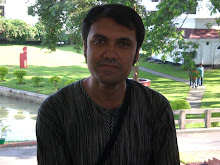Back from 'crossfire'
bdnews24.com correspondents
"I understood the place was Shayestaganj in Lalbagh. From there I was taken to a vacant place in Postogola area. They tried to tie me down. I tried to resist. The RAB men fired blank and shouted, 'The terrorist is fleeing. Catch him. Shoot him.'"
"One of them rode on my chest and started beating me. All the time they were asking me to give them the firearms," says Mohammad Babul, 30, of Ispahani area in Aganagar of Dakhhin Keraniganj in
RAB said he was a suspected criminal, an allegation he laughs off.
"One of them said, 'Shoot him in the leg.' One shot me on the right leg. I screamed in pain. Another said, 'Shoot him again' and I took another bullet in my leg. I was praying to Allah all the time (for my life)."
A RAB officer told the officer-in-charge of Lalbagh Police Station on the phone, "We have caught a terrorist from your area. Come over."
"A police car came in and I was taken into it."
From his bed at
A bdnews24.com correspondent was stopped at first by policemen from talking to Babul in hospital, as he was under police custody. A phone call to the Lalbagh police chief resulted in the correspondent getting two minutes to speak to Babul.
As Babul was speaking, his wife was wiping tears, her three-year-old son in her arms.
Babul said that he was lucky to be alive and that he was not involved with any criminal activities, a claim the police statements support.
RAB hold onto the "crossfire" story, though. They claim Babul is a 'top terror'.
RAB officials said after the arrest on Thursday afternoon—Wednesday evening, says Babul—when they along with Babul had gone to recover firearms Babul's "accomplices" used to fire on them.
Babul tried to flee during the firefight and received bullet injuries, RAB claimed.
Babul told bdnews24.com that he had gone to Kaliganj to realise dues Wednesday and a team of RAB-10 arrested him there.
"At about
"There they beat me. When I asked them what my fault was, a RAB officer said, 'You have mugged Tk 24 lakh. Where are the arms? Bring them out.'
"I said I have no arms but they weren't listening. They detained me there."
"They took me to Shayestaganj in Lalbagh early Thursday morning for 'crossfire'," Babul said.
Babul admitted to bdnews24.com that there had been a fraud case against him.
But he said he had never been involved with criminal activities.
A RAB-10 official, flight lieutenant Mostafa Humayun Kabir said to bdnews24.com: "Babul is a listed top criminal of Kotwali-Islampur area. There are at least seven extortion and fraud cases against him. Most of them are with Kotwali police."
Kotwali police chief Abdul Hannan told bdnews24.com Friday, "There are a number of fraud cases against Babul. But he is not on the list of criminals, let alone being a top criminal."
RAB's Kabir insisted, "Babul is one of the masterminds behind the mugging of Tk 13 lakh, done by exploding bombs in Islampur area in the first half of this month."
On quizzing Babul, the law-enforcers retrieved a revolver and two rounds of bullet, Kabir said.
RAB-10 commanding officer SM Kamal Hossain alleged: "Babul is a criminal in the guise of a clothes trader. He also ran a syndicate of brand forgers and sold counterfeit clothes."
RAB director general Hasan Mahmud Khandaker told bdnews24.com: "I heard about the incident, but I don't have further details."
RAB was formed on
Human rights leader Sultana Kamal said: "A criminal, however notorious, should be tried under law."
RAB courted controversy for killings in so-called crossfire, which international human rights activists describe as extrajudicial killings. They accuse RAB of simply shooting suspects to death after arrests and making up story of armed gunfight with the cohorts of the suspects.
Human-rights organisation Odikhar recorded 184 extrajudicial killings by law-enforcement agencies in 2007, with 94 of them in the hands of RAB officers.
(REUSED WITH PERMISSION)





